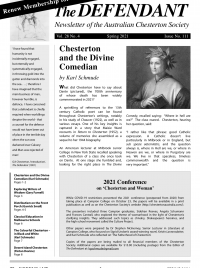A distinctive mark of Chesterton’s mountainous writings is that he did not confine his most significant insights to his most significant books.
This has often made his popular sayings hard to trace – and vulnerable to misquoting. For example, his statement, “The Christian ideal has not been tried and found wanting. It has been found difficult; and left untried”, is not found, as might be supposed, in one of his more famous works of philosophy and theology, such as Orthodoxy. It was published in his lesser known book of sociology, What‘s Wrong with the World (1910).
The appearance of a new volume of Chesterton essays, most of which have not previously been collected (and certainly not in their historical context as part of two series in now-defunct journals), highlights the challenge, as well as the joy, of uncovering Chesterton’s decades of prodigious journalism.
It contains 39 essays he wrote for two journals, Black and White and The Bystander. It abounds in quotable insights – for example:
On the value of the ordinary and the familiar:
“The conventional world is far more wild and fascinating than the unconventional. . . . It is really unconventionalism that is old and fastidious: it is conventionalism that is as new and triumphant as the world. ”
On bigotry arising from a lack of beliefs:
“It is a total error to suppose that the possession of convictions – of hard, strong, unquenchable convictions – makes a man bigoted. It is quite the other way. The most bigoted people in the world are the people who have not got any convictions at all.”
On madness arising from unbelief:
“By far the greater number of people mentally unbalanced are mentally unbalanced in the direction of a universal scepticism. The beginnings of madness are not to be found in beliefs, however wild or weird: they are to be found in unbelief, however minute and unimportant.”
Chesterton was at the height of his creative intellectual powers in these early years of the 20th century. He wrote these series of essays in 1903-04, at about the same time as The Napoleon of Notting Hill (1904), and just before Heretics (1905), which was itself a precursor of Orthodoxy (1908).
That the essays have been gathered together is the result of an admirable salvage operation by the Norwegian scholar, Geir Hasnes, who is notable for his outstanding work as Chesterton’s bibliographer – and the retrieval of endless, elusive references to Chesterton’s writings.
After years of painstaking labour, Geir is about to publish a comprehensive bibliography of Chesterton. It is an eagerly awaited work for Chesterton devotees, and will be highlighted in a future edition of The Defendant.
Chesterton in Black and White has four sections. The first, That Black is White, contains such essays as “That Respectable People are More Interesting than Bohemians” and “That Poetical People are the Most Practical”; the second, The Creed of a Credulous Person, includes “The Joys of the Incredulous”; the third, The Decline of Amateur Professions, looks at various examples of “decline”, includ- ing of the “Amateur Actor” and the “Amateur Politician”; and the fourth, “With the Long Bow”, presents fourteen essays on romance and literature in general.
Are there special aspects of Chesterton’s thought and writing revealed in this new compilation, Chesterton in Black and White? A key feature of the book, as Geir Hasnes notes in his Introduction, is that these essays contain early hints of his public defence of Christian belief, which he was to unfold more fully and impressively in Orthodoxy.
One example is the essay, “The Cruelty of the Incredulous,” where he asks whether the cruelty of Christians is unique to them – or, as he believes, “as ancient as the grass”.
“Christianity,” he says, “did not invent tortures. One would almost find a kind of pleasure in believing that it did.” Rather, “they were the broken playthings of the brutal childhood of the world”.
Here, in a single sentence, Chesterton expressed his vision of a world ruptured by sin but made whole by the recovered innocence of childhood – a familiar theme in his later writing.
Chesterton in Black and White: Essays by G.K. Chesterton from Black and White and The Bystander, 1903-1904. Edited with an Introduction by Geir Hasnes (Kongsberg, Norway: Classica forlag, 2021). Copies available from the shop of the Society of Gilbert Keith Chesterton, at abebooks or ebay, US$49.95.
